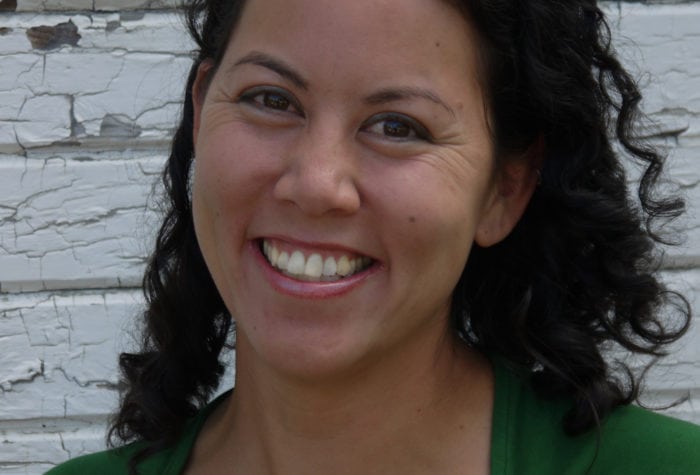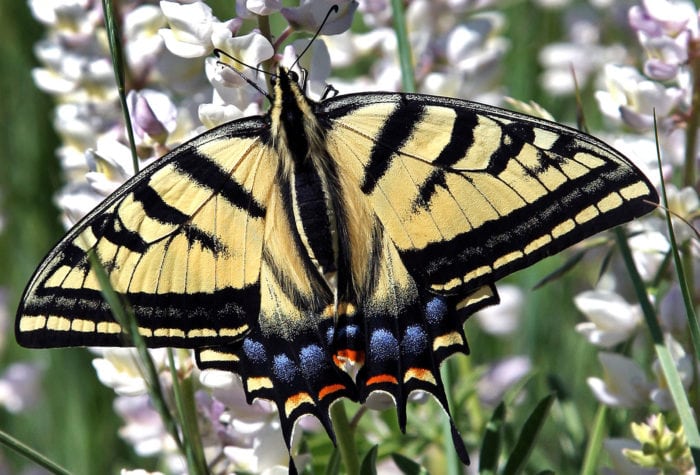Author: Renee Schiavone | Published: September 13, 2023 | Category: Look Back
From getting the opportunity to reconnect with indigenous communities to finding work that truly interests him
In 2021, Wesley Scott was looking for a change. In the midst of his second year studying computer engineering, he not only felt lost in his career trajectory but also disconnected to any Native American community to which he had roots. When presented with the opportunity to take part in ONDA’s Tribal Stewards project, Wes embraced the change and came away with an experience that changed his perspective on the whole field of conservation. Read Wes’s own words about his journey, his connection to Tribal Stewards and where he’s headed next:
1. Tell us a bit about yourself!
I was born and raised in Klamath county in southern Oregon on the Klamath reservation. I currently live in Las Vegas, Nevada where I work as a plant biotechnician for the National Park Service. I identify as Native American and belong to the Confederated Tribes of Siletz Indians. I also have my roots with the Klamath people in Oregon, the Yurok people in northern California and the Mole Lake band of Chippewa in Wisconsin. I have a vested interest in natural sciences, with a focus in biology and geography. I consider myself an avid hiker with little preference on where I hike, whether it is in the wilderness searching for a stunning viewpoint, or a sprawling cityscape searching for a cup of coffee.
2. What initially drew you to participate in Tribal Stewards?
The initial draw to Tribal Stewards was a need for change in my own routine. Prior to joining I had just finished my second year at community college and had the same job as a cashier at Fred Meyer. After years of repetition the opportunity presented itself when my older sister Haley introduced me to Tiyana Casey, the program coordinator at the time. The rest is more or less history for me.
3. What was your knowledge of or experience in natural resources, land stewardship or conservation prior to Tribal Stewards?
I had essentially zero practicable or applicable knowledge to natural resources and conservation prior to joining, save some knowledge on cultural land stewardship that I had received growing up on a reservation. Coming into Tribal Stewards, my secondary education was primarily rooted in computer science and engineering and with that for me at least there was not a lot of overlap between the fields.
4. What kind of work did you complete or participate in during your time with Tribal Stewards? Any favorite projects or memories that have stuck with you?
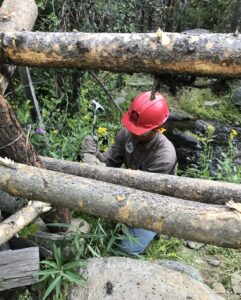
I had the opportunity to participate in several really great projects throughout eastern and northwest Oregon. The one project that always comes to mind when I reflect on my time with this program is the falcon surveys that I got to observe. Just remembering those little birds who were still too young to even fly always brings a smile for me. One other project that stuck with me through the years is fence building. In the Malheur National Forest, we got to build a buck and pole fence from scratch and the whole experience was simple fun.
5. Was there a type of work you did during the program that gave you experience in something you then became interested in pursuing further?
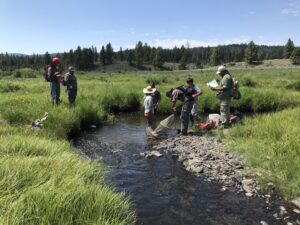
The type of work that I had the opportunity to experience that made me more interested was the monitoring and inventorying work. One such project was surveying for salmon at Big Creek in the Logan Valley. Here we were given nets, buckets, waders and GPS devices. We go to hike up the creek, set the nets and take points. After about a half day’s wait we revisited and scooped out the fish we caught and counted hundreds of trout but no salmon unfortunately. This experience was but another nudge in the push that sent me down the path of conservation and land stewardship.
6. What are you up to now? Have you in any way continued your journey into natural resources, land stewardship or conservation?
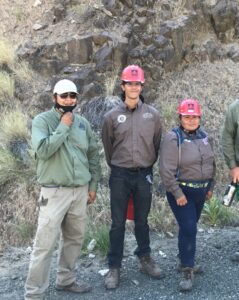
I am very excited to answer this question! I have continued my journey in Natural Resources in two ways that I am very proud of and can link being a Tribal Steward directly with. First, I am a full-time student at Oregon State University where I am pursuing a B.S. in Environmental Science with a focus on Conservation and Resource Management, with an expected graduation in the year 2026. And second, I have hit the proverbial jackpot for a person in conservation by getting a permanent full time position as a member of the National Park Service’s Invasive Plant Management Team based out of Lake Mead near Las Vegas. I get to travel the southwest and do invasive plant treatment in the region’s parks, forests and other public lands.
7. How did Tribal Stewards, if at all, change your perspective on the fields of natural resources, land stewardship or conservation?
I believe that being in Tribal Stewards broadened my perspective on most of these fields overall. It gave a brief taste of everything ranging from recreation to wildlife surveys to invasive plant treatment to wetland area restoration and protection.
8. How did Tribal Stewards, if at all, affect you personally?
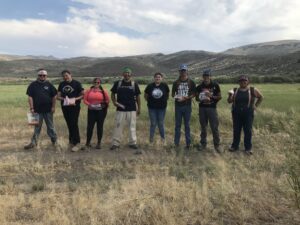
Tribal Stewards helped return something to me that I did not know I had lost.It returned me to an indigenous community. Prior to joining, I had been away from my home for just over seven years. Had not been involved in any Native American community at that time. That changed when I joined the Tribal Stewards. It set me down a path of reconnecting to my own communities. It helped me heal.
9. How did Tribal Stewards, if at all, affect your career trajectory?
Tribal Stewards had a major role in changing the path I was taking. Before, I was on a path of convenience, studying computer engineering. At the time I was learning how to program and creating media content. For me at the time it was a means to an unknown end, I did not know where I would end up in terms of finding a career. Now with all the changes that I have gone through, I have much clearer and achievable goals. Now I know where I want to be and how to get that for myself.
ONDA’s Tribal Stewards project offers Native American young adults an introduction to conservation careers and provides hands‐on experience and opportunities for personal growth within a culturally relevant framework. ONDA launched this effort in 2019 at the request of our tribal partners and in connection with our diversity, equity, inclusion and justice work. Our partners include federal agencies and other Oregon high desert land managers. Read more about ONDA’s Tribal Stewards initiative.
Thank you to Wes for sharing your story! We hope his experience will inspire the next group of tribal young adults to explore the field and grow new connections.
